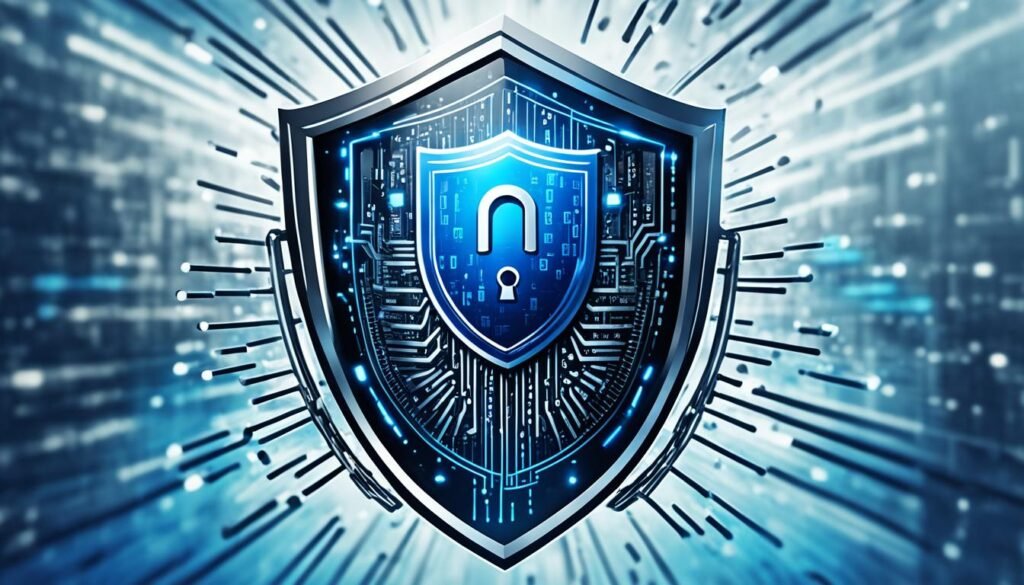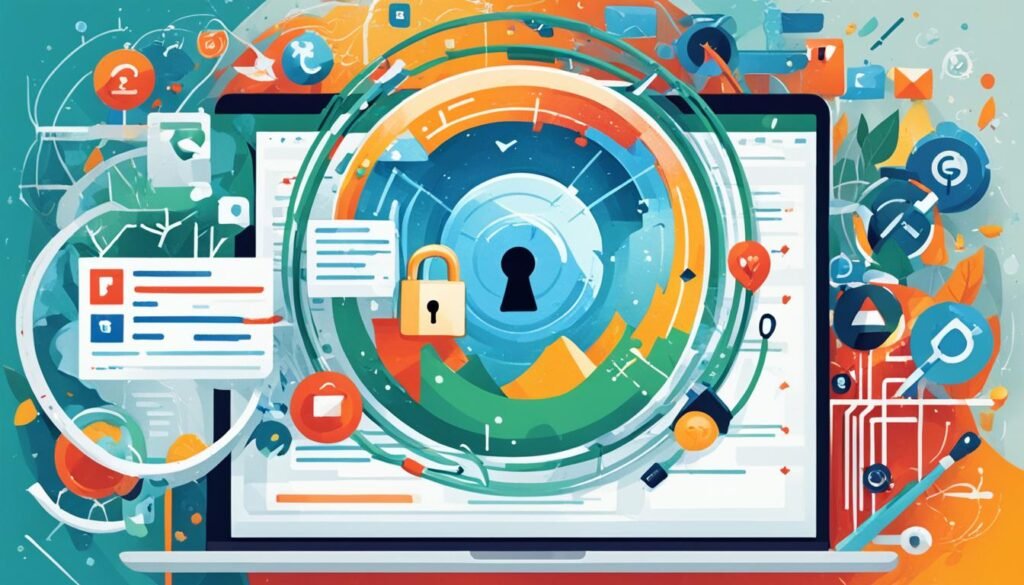In today’s digital world, where our lives are increasingly intertwined with the internet, ensuring your online safety is paramount. From personal information privacy to protection against cyber threats, adopting secure browsing habits is crucial for a worry-free online experience. But what exactly does secure browsing entail? And how can you protect yourself from potential risks?
In this article, we will explore essential tips and best practices to help you navigate the virtual landscape with confidence. From safeguarding your sensitive data to maintaining a secure connection, we’ll cover everything you need to know about staying safe online. So, let’s dive in and discover how you can bolster your internet security, protect your privacy, and enjoy safe web browsing.
Key Takeaways:
- Secure browsing is vital for protecting your online privacy and safeguarding your personal information.
- By following secure browsing tips, you can enhance your internet security and reduce the risk of falling victim to cyber threats.
- Utilizing a secure web browser, implementing strong passwords, and regularly updating your software are important steps in maintaining online safety.
- A Virtual Private Network (VPN) can provide an added layer of protection by encrypting your internet connection and ensuring your anonymity.
- Being aware of spyware and taking proactive internet safety measures can further enhance your browsing security.
The Importance of Internet Safety
In today’s digital age, maintaining internet safety is crucial. With the increasing prevalence of online activities, it is essential to understand the risks associated with sharing personal information and develop good online habits. Neglecting internet safety can leave you vulnerable to scams, identity theft, and other cybersecurity risks.
By prioritizing internet safety, you can protect yourself from potential harm and safeguard your personal information. Whether it’s browsing social media, shopping online, or conducting financial transactions, being aware of the cybersecurity risks is of utmost importance. Adopting safe online habits is the first step towards ensuring a secure online experience.
- Always be cautious when sharing personal information online, including your full name, address, phone number, and financial details.
- Regularly review and adjust your privacy settings on social media platforms to control who can access your information.
- Be wary of suspicious emails, messages, or calls asking for personal information or financial details. Avoid clicking on unfamiliar links or downloading attachments from unknown sources.
- Utilize strong and unique passwords for each of your online accounts. Consider using a password manager to securely store and manage your login credentials.
- Ensure your devices, including computers, smartphones, and tablets, have reliable antivirus software and security updates installed.
The Risks of Careless Online Habits
“Sharing personal information online without caution is like giving strangers the keys to your house.
Careless online habits can expose you to a variety of threats:
| Cybersecurity Risks | Impact |
|---|---|
| Identity theft | Financial loss and damage to reputation |
| Phishing scams | Loss of personal and financial information |
| Malware and ransomware attacks | Data loss, financial extortion, and system damage |
| Online stalking | Invasion of privacy and potential physical harm |
By understanding these risks and adopting responsible online habits, you can minimize the chances of falling victim to cyber threats.
Protecting your personal information and maintaining internet safety is an ongoing effort. Stay informed about the latest cybersecurity threats and best practices to ensure your online experiences are secure and enjoyable.
Top 10 Internet Safety Rules
When it comes to online safety, following certain rules can go a long way in protecting yourself and your personal information. Here are the top 10 internet safety rules you should keep in mind:
- Use strong passwords: Always create unique and complex passwords that are difficult for others to guess. Include a combination of letters, numbers, and special characters.
- Be cautious with personal information: Avoid sharing sensitive personal information, such as your full name, address, phone number, or financial details, on unsecured websites or with unknown sources.
- Adjust privacy settings: Take the time to review and adjust the privacy settings on your social media accounts and other online platforms. Limit the amount of personal information visible to others.
- Practice safe browsing: Stick to reputable websites and avoid clicking on suspicious links or downloading files from untrusted sources. Use precautionary measures, such as enabling pop-up blockers and disabling automatic downloads.
- Ensure a secure internet connection: When accessing the internet in public places, make sure to use a secure Wi-Fi network. Avoid conducting sensitive transactions or sharing personal information when connected to public Wi-Fi.
- Exercise caution when downloading: Be mindful of what you download from the internet. Only download files or documents from trusted sources and verify that they are free from viruses or malware.
- Regularly update your software: Keep your operating system, web browsers, and security software up to date. Software updates often include important security patches that help protect against emerging threats.
- Be wary of phishing attempts: Be cautious of unsolicited emails or messages requesting personal information or urging you to click on suspicious links. Double-check the legitimacy of such requests before taking any action.
- Enable two-factor authentication: Add an extra layer of security to your online accounts by enabling two-factor authentication. This will require you to provide an additional verification code along with your password when logging in.
- Use reliable security software: Install reputable antivirus software and keep it updated. This will help detect and remove malware, as well as provide real-time protection against online threats.
By adhering to these internet safety rules, you can significantly reduce the risk of encountering online threats and protect your personal information.
Secure Browsing Tips
To ensure safe browsing and protect your online privacy, it is essential to implement the following tips:
- Keep your browser up to date: Regularly update your web browser to the latest version. Updated browsers often include security patches and enhancements that protect you from potential vulnerabilities.
- Opt for HTTPS: Look for the padlock icon and “HTTPS” in the website URL before sharing any sensitive information. HTTPS ensures a secure and encrypted connection between your device and the website, safeguarding your data from eavesdroppers.
- Clear cookies and cache: Periodically clear your browser’s cookies and cache to remove stored data that could potentially be accessed by unauthorized individuals. This helps protect your browsing history and personal information.
- Exercise caution when downloading: Be cautious when downloading files or programs from the internet. Only download from trusted sources and avoid opening email attachments or clicking on links from unknown or suspicious senders.
- Install antivirus and firewall protection: Equip your device with reliable antivirus software and enable a firewall to protect against malware, viruses, and other online threats. Regularly update your antivirus software to ensure optimal security.
By following these secure browsing tips, you can significantly reduce the risk of encountering cybersecurity threats and protect your online activities.
Using a Virtual Private Network (VPN)
https://www.youtube.com/watch?v=tJJ37XYsTac
When it comes to browsing the internet, your online security and privacy should always be a top priority. One effective way to achieve a secure internet connection and protect your online identity is by using a Virtual Private Network (VPN).
A Virtual Private Network, or VPN, creates a secure and encrypted connection between your device and the internet. By routing your internet traffic through a remote server, a VPN allows you to browse the web anonymously and prevents potential eavesdroppers or hackers from intercepting your data.
Why should you consider using a VPN?
- Secure Internet Connection: A VPN encrypts your data, adding an extra layer of security to your online activities. This encryption ensures that your sensitive information, such as passwords and credit card details, remains confidential.
- Online Anonymity: By masking your IP address, a VPN enables you to browse the web anonymously. This means your online activities cannot be traced back to your device, enhancing your privacy.
- Data Encryption: VPNs use advanced encryption protocols to secure your internet traffic. This encryption makes it extremely difficult for anyone to intercept or decipher your data, providing you with peace of mind.
By using a VPN, you can enjoy a safer browsing experience and protect your sensitive information from potential threats. Whether you’re accessing public Wi-Fi networks, traveling abroad, or simply trying to maintain online privacy, a VPN is an essential tool.
Be Wary of Spyware
Spyware poses a significant threat to your internet browsing safety. This malicious software can silently infiltrate your devices and steal sensitive data without your consent. To protect yourself from spyware attacks, it is crucial to be vigilant and aware of its lurking presence. Spyware can be encountered on deceptive websites or through unsuspecting clicks on pop-ups or links. It blends seamlessly into seemingly harmless online content, making it difficult to detect.
One way to safeguard your browsing experience is to avoid suspicious websites. These deceptive websites often entice users with incredible offers, free downloads, or engaging content. However, behind their enticing facade lies an intricate web of spyware designed to exploit unsuspecting visitors. By exercising caution and adhering to safe browsing practices, you can significantly reduce the risk of encountering spyware.
Characteristics of Deceptive Websites:
- Poor design and outdated appearance
- Misleading or exaggerated claims
- Prominent download buttons or enticing offers
- Unsecure webpage (HTTP instead of HTTPS)
- Missing or vague contact information
It’s essential to exercise caution and trust your instincts when browsing the internet. If a website seems dubious or too good to be true, it’s best to navigate away and consider safer alternatives. Additionally, it’s wise to install and regularly update reputable security software that can detect and block spyware infections.
Remember, prevention is key when it comes to spyware. By staying vigilant, practicing safe browsing habits, and being cautious of deceptive websites, you can protect yourself and your sensitive information from falling into the wrong hands.
| Protective Measures Against Spyware | Effectiveness |
|---|---|
| Use reputable antivirus or antispyware software | High |
| Enable automatic software updates | High |
| Avoid clicking on suspicious links or pop-ups | High |
| Regularly scan your device for malware | Moderate |
| Be cautious while downloading files or programs | Moderate |
| Utilize browser extensions that block malicious content | Moderate |
| Consider using a virtual private network (VPN) | Moderate |
By following these precautions and maintaining a keen eye for deceptive websites, you can minimize the risk of falling victim to spyware attacks. Stay proactive and prioritize your online safety to browse the internet with peace of mind.
Internet Safety Measures

Taking proactive internet safety measures is crucial to protecting your online activities. By implementing the following key measures, you can enhance your security and safeguard your personal information.
Avoid Questionable Websites
Be cautious when visiting websites that have a questionable reputation or content. These websites may contain malware or phishing attempts that can compromise your online security. Stick to reputable websites and exercise caution before clicking on any unfamiliar links.
Regularly Update Your Software
Keep your operating system, web browsers, and other software up to date. Software updates often include security patches that address vulnerabilities and protect against potential threats. Enable automatic updates whenever possible to ensure you have the latest security features.
Adjust Browser Security Settings
Take advantage of the security settings available in your web browser. Enable features such as pop-up blockers, privacy settings, and the “Do Not Track” option. These settings can help prevent intrusive ads, limit the collection of your browsing data, and protect your privacy.
Exercise Caution with Email Attachments
Be wary of email attachments, especially if they come from unknown or suspicious sources. Malicious attachments can contain viruses or malware that can infect your device and compromise your security. Before opening any email attachment, verify the sender and scan the file with reliable security software.
Utilize Reliable Security Software
Install and regularly update reliable security software on your devices. Antivirus software, antispyware software, and firewalls can detect and remove malware, providing an additional layer of protection against online threats. Choose reputable security software that offers real-time scanning and automatic updates for comprehensive protection.
By following these internet safety measures, you can significantly reduce the risk of falling victim to online threats. Stay vigilant and stay safe while enjoying your online activities!
Strong Passwords and Two-Factor Authentication
Creating strong passwords and utilizing two-factor authentication can significantly enhance your online account security. By following these proactive measures, you can protect yourself against potential cyber threats and safeguard your personal information.
Create Strong Passwords
The first step in strengthening your online account security is to create strong passwords. Avoid using easily guessable passwords such as “123456” or “password.” Instead, create unique and complex passwords that include a combination of uppercase and lowercase letters, numbers, and special characters.
Remember: The longer and more complex your password is, the harder it is for hackers to crack.
Consider Using a Password Manager
Managing multiple strong passwords can be challenging. Consider using a password manager tool to securely store and organize your login credentials. Password managers generate strong passwords for you and remember them, so you don’t have to. This eliminates the need to remember numerous complex passwords and reduces the risk of using weak or repeated ones.
Implement Two-Factor Authentication
Two-factor authentication (2FA) is an additional layer of security that requires you to provide two forms of identification during the login process. It adds an extra step to the authentication process, further enhancing your online account security. Common 2FA methods include:
- SMS verification codes sent to your registered phone number
- Email verification codes sent to your registered email address
- Biometric authentication, such as fingerprint or facial recognition
- Authentication apps, such as Google Authenticator or Authy
2FA provides an added level of protection, even if someone discovers your password. Implementing this security measure significantly reduces the risk of unauthorized access to your online accounts.
| Benefits of Strong Passwords and Two-Factor Authentication | |
|---|---|
| Enhanced Security | Protect your online accounts from unauthorized access and potential data breaches. |
| Reduced Risk of Password-related Attacks | Strong passwords and 2FA make it significantly harder for hackers to guess or crack your login credentials. |
| Increased Privacy | Secure your personal information and prevent identity theft. |
| Convenience | Password managers simplify the process of managing multiple strong passwords, making it easier to access your accounts. |
A combination of strong passwords and two-factor authentication is a powerful defense against online threats. Remember to regularly update your passwords, enable 2FA whenever possible, and utilize password manager tools to enhance your online account security.
Using a Secure Web Browser

When it comes to browsing the web, using a secure web browser is an essential step in protecting your online safety. Not all browsers are created equal, and some offer built-in security features that can enhance your internet security. By opting for a browser with features like ad blockers and the “Do Not Track” feature, you can further safeguard your online activities.
The Benefits of Ad Blockers
Ad blockers are powerful tools that can enhance your browsing experience and protect you from malicious advertisements. These small add-ons prevent annoying pop-up ads from disrupting your web surfing. Additionally, ad blockers can shield you from harmful ads that may attempt to infect your device with malware or track your online activity.
Keeping Your Online Activity Private
The “Do Not Track” feature is another valuable tool offered by secure web browsers. This feature enables you to notify websites that you do not want your online activity to be tracked. By enabling the “Do Not Track” feature, you can limit the amount of data collected about your browsing habits, thereby enhancing your online privacy.
“Using a secure web browser with ad blockers and the ‘Do Not Track’ feature is a proactive step towards protecting your online privacy and security.”
While there are several secure web browsers available, some popular options include:
| Secure Web Browsers | Key Features |
|---|---|
| Google Chrome |
|
| Mozilla Firefox |
|
| Opera |
|
Choose a browser that aligns with your security preferences and offers the necessary features to protect your online presence.
When browsing the web, remember to keep your browser and its extensions up to date. Regular updates ensure that you have the latest security patches and protection against emerging threats.
By using a secure web browser with ad blockers and the “Do Not Track” feature, you can browse the web confidently while keeping your online activities private and protected.
Internet Security Software
When it comes to protecting your devices from online threats, having reliable internet security software is crucial. Antivirus and antispyware software play a vital role in detecting and removing malware, ensuring your computer stays safe and secure. Additionally, secure web browsing features offer an extra layer of protection, safeguarding your online activities and personal information.
Investing in reputable internet security software is an investment in the long-term protection of your computer and personal data.
With a wide range of options available in the market, it’s important to choose software that suits your specific needs. Look for antivirus software that offers real-time scanning, automatic updates, and regular system scans to identify and eliminate any potential threats.
Antispyware software, on the other hand, focuses on detecting and removing spyware that collects information without your consent. By regularly scanning your system and removing any spyware, you can ensure your privacy remains intact.
In addition to antivirus and antispyware protection, secure web browsing features are essential. These features protect you from malicious websites, phishing attempts, and other online threats. They can block unsafe websites, warn you about potential dangers, and provide secure connections, giving you peace of mind while browsing the internet.
| Benefits of Internet Security Software |
|---|
| Protection against malware: Antivirus software detects and removes malicious software, viruses, and other threats that can harm your computer. |
| Privacy and data protection: Antispyware software safeguards your personal information by detecting and removing spyware that collects data without your consent. |
| Secure web browsing: Internet security software provides features such as safe browsing, anti-phishing, and secure connections to protect you from online threats while surfing the web. |
| Regular updates and scans: Stay protected with automatic software updates and regular system scans to identify and eradicate the latest threats. |
When choosing internet security software, opt for trusted brands that have a proven track record of delivering reliable protection. It’s worth considering factors such as user reviews, customer support, and additional features like firewall protection and email scanning.
Protecting your devices with internet security software is an essential step in ensuring your online safety and maintaining a secure computing environment. Don’t compromise when it comes to the protection of your valuable data and personal information.
Conclusion
Internet safety and secure browsing are paramount in today’s digital landscape. By implementing the tips mentioned in this article, you can enhance your online protection and safeguard your personal information. It is crucial to prioritize internet safety by following secure browsing habits and staying vigilant against cyber threats.
Remember to regularly update your security measures and utilize reputable internet security software to stay one step ahead of potential risks. By practicing safe browsing, you can mitigate the chances of falling victim to scams, identity theft, or other cybersecurity breaches.
Protecting your online presence is essential in maintaining your privacy and ensuring the security of your sensitive information. By understanding the importance of internet safety and implementing the necessary precautions, you can browse the web with confidence and peace of mind.


